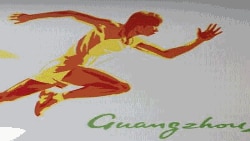The Asian Games have returned to China after 20 years, this time to the southern city of Guangzhou.
Some 10,000 athletes from 45 countries and territories in Asia and the Middle East have arrived in Guangzhou for the 16th Asian Games. This is the biggest international sporting event China has hosted since the 2008 Olympic Games.
The opening ceremony Friday evening attended by Chinese Premier Wen Jiabao started with fireworks exploding from the entire length of the Guangzhou TV Tower - the tallest building in the city.
The water-themed extravaganza featured huge fountains and waterfalls, with a child on a leaf seemingly floating on air and water. A Chinese boat also sailed amid an illusion of waves. The renowned Chinese pianist Lang Lang performed on a stage of water.
And then the athletes emerged on stage.
Security has been tightened in Guangzhou, the capital of southern Guangdong province that shares a border with Hong Kong. Police also said they have rounded up about 600 "fugitives" ahead of the games. Authorities have also temporarily relocated residents nearest to the ceremony's venue.
Guangzhou has spent $2 billion to build stadiums and other facilities for the games, in what is seen as a coming out party of China's manufacturing and export hub.
Nearly 4,000 medals will be awarded this year, in events ranging from popular sports like soccer and cricket, to traditional sports like sepak takraw, a Southeast Asian game which uses a woven rattan ball, and for the first time, dragon boat racing.
China topped the medals tally in the last seven Asian Games, which is held every four years. South Korea says it aims to repeat its second overall finish four years ago in Doha.
Japan is sending its largest delegation ever. However, a territorial dispute between China and Japan threatened to spill over into the playing fields. To prevent any clashes, organizers separated Chinese and Japanese fans at a pre-opening soccer match.
The Guangzhou games will end on November 27.




